Essay on the Question: Is God the Foundation of Morality?
VerifiedAdded on 2023/01/19
|6
|1770
|93
Essay
AI Summary
This essay delves into the complex relationship between morality and the existence of God, questioning whether divine authority is essential for establishing ethical frameworks. It begins by acknowledging the common belief that morality is intrinsically linked to faith and the existence of God, but subsequently challenges this notion by examining the role of human agency in shaping moral values. The essay explores the concept of moral relativity, highlighting how societal events and their consequences influence human understanding of right and wrong. It also delves into various arguments, including the co-existence of different religions, the actions of historical figures, and the inherent flaws in assuming God's actions are inherently moral. The essay concludes that morality is not solely dependent on a divine being and that it is, in fact, a dynamic concept shaped by human experiences, social interactions, and the evolution of ethical systems over time. The author suggests that humanity has always created its own ethics, making the morality they follow nothing divine. The essay refers to various philosophical and religious texts to support its arguments.
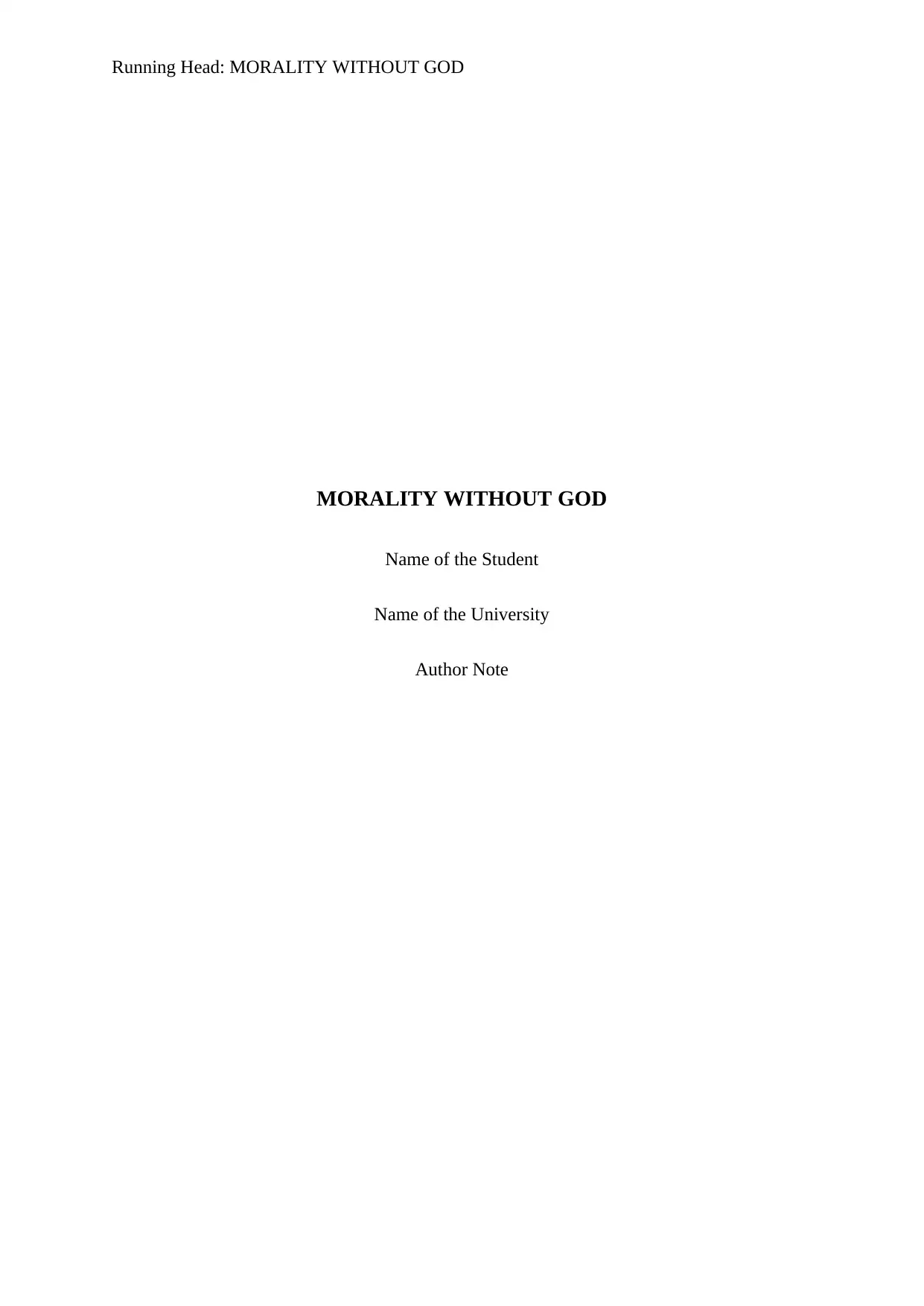
Running Head: MORALITY WITHOUT GOD
MORALITY WITHOUT GOD
Name of the Student
Name of the University
Author Note
MORALITY WITHOUT GOD
Name of the Student
Name of the University
Author Note
Paraphrase This Document
Need a fresh take? Get an instant paraphrase of this document with our AI Paraphraser
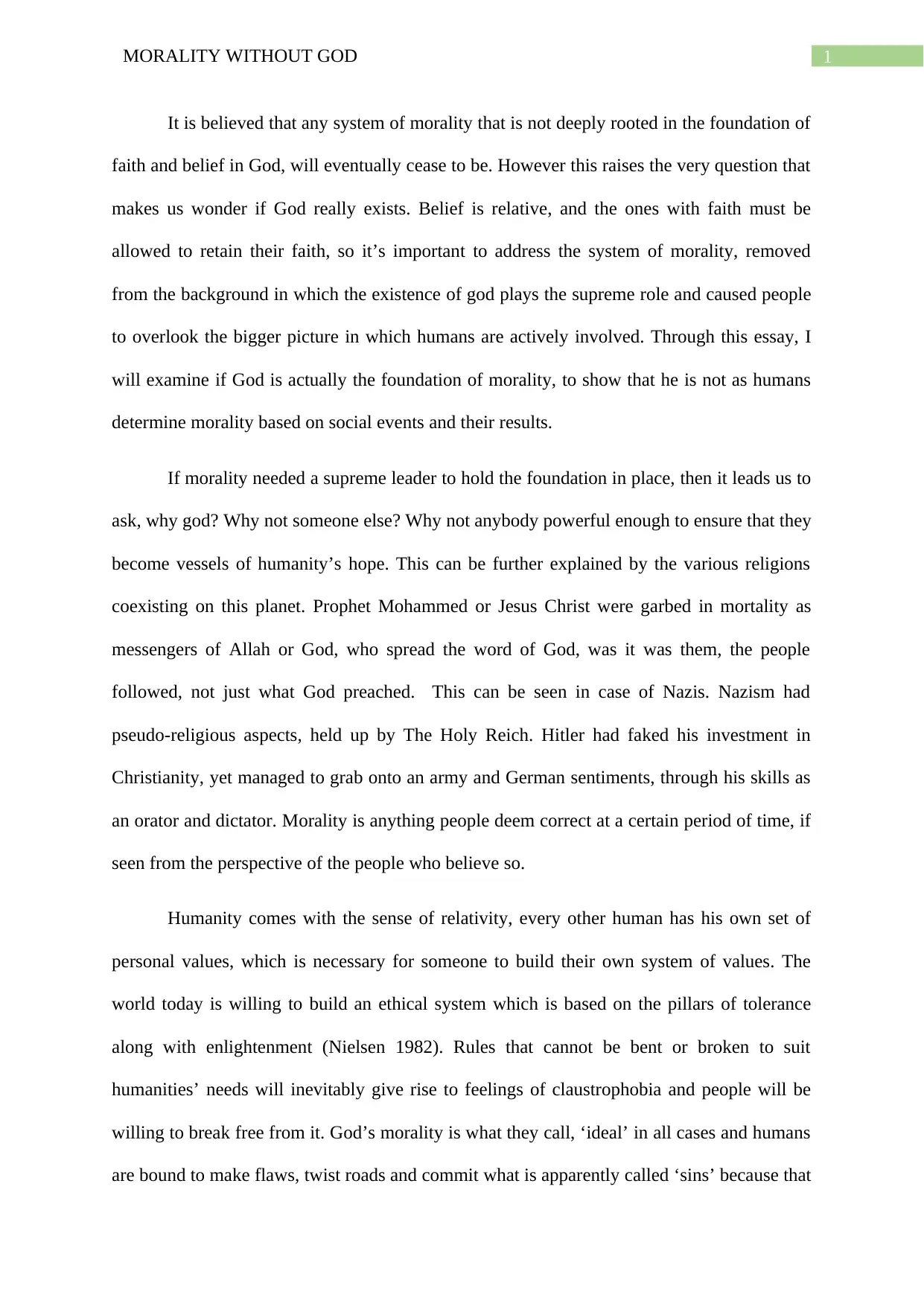
1MORALITY WITHOUT GOD
It is believed that any system of morality that is not deeply rooted in the foundation of
faith and belief in God, will eventually cease to be. However this raises the very question that
makes us wonder if God really exists. Belief is relative, and the ones with faith must be
allowed to retain their faith, so it’s important to address the system of morality, removed
from the background in which the existence of god plays the supreme role and caused people
to overlook the bigger picture in which humans are actively involved. Through this essay, I
will examine if God is actually the foundation of morality, to show that he is not as humans
determine morality based on social events and their results.
If morality needed a supreme leader to hold the foundation in place, then it leads us to
ask, why god? Why not someone else? Why not anybody powerful enough to ensure that they
become vessels of humanity’s hope. This can be further explained by the various religions
coexisting on this planet. Prophet Mohammed or Jesus Christ were garbed in mortality as
messengers of Allah or God, who spread the word of God, was it was them, the people
followed, not just what God preached. This can be seen in case of Nazis. Nazism had
pseudo-religious aspects, held up by The Holy Reich. Hitler had faked his investment in
Christianity, yet managed to grab onto an army and German sentiments, through his skills as
an orator and dictator. Morality is anything people deem correct at a certain period of time, if
seen from the perspective of the people who believe so.
Humanity comes with the sense of relativity, every other human has his own set of
personal values, which is necessary for someone to build their own system of values. The
world today is willing to build an ethical system which is based on the pillars of tolerance
along with enlightenment (Nielsen 1982). Rules that cannot be bent or broken to suit
humanities’ needs will inevitably give rise to feelings of claustrophobia and people will be
willing to break free from it. God’s morality is what they call, ‘ideal’ in all cases and humans
are bound to make flaws, twist roads and commit what is apparently called ‘sins’ because that
It is believed that any system of morality that is not deeply rooted in the foundation of
faith and belief in God, will eventually cease to be. However this raises the very question that
makes us wonder if God really exists. Belief is relative, and the ones with faith must be
allowed to retain their faith, so it’s important to address the system of morality, removed
from the background in which the existence of god plays the supreme role and caused people
to overlook the bigger picture in which humans are actively involved. Through this essay, I
will examine if God is actually the foundation of morality, to show that he is not as humans
determine morality based on social events and their results.
If morality needed a supreme leader to hold the foundation in place, then it leads us to
ask, why god? Why not someone else? Why not anybody powerful enough to ensure that they
become vessels of humanity’s hope. This can be further explained by the various religions
coexisting on this planet. Prophet Mohammed or Jesus Christ were garbed in mortality as
messengers of Allah or God, who spread the word of God, was it was them, the people
followed, not just what God preached. This can be seen in case of Nazis. Nazism had
pseudo-religious aspects, held up by The Holy Reich. Hitler had faked his investment in
Christianity, yet managed to grab onto an army and German sentiments, through his skills as
an orator and dictator. Morality is anything people deem correct at a certain period of time, if
seen from the perspective of the people who believe so.
Humanity comes with the sense of relativity, every other human has his own set of
personal values, which is necessary for someone to build their own system of values. The
world today is willing to build an ethical system which is based on the pillars of tolerance
along with enlightenment (Nielsen 1982). Rules that cannot be bent or broken to suit
humanities’ needs will inevitably give rise to feelings of claustrophobia and people will be
willing to break free from it. God’s morality is what they call, ‘ideal’ in all cases and humans
are bound to make flaws, twist roads and commit what is apparently called ‘sins’ because that
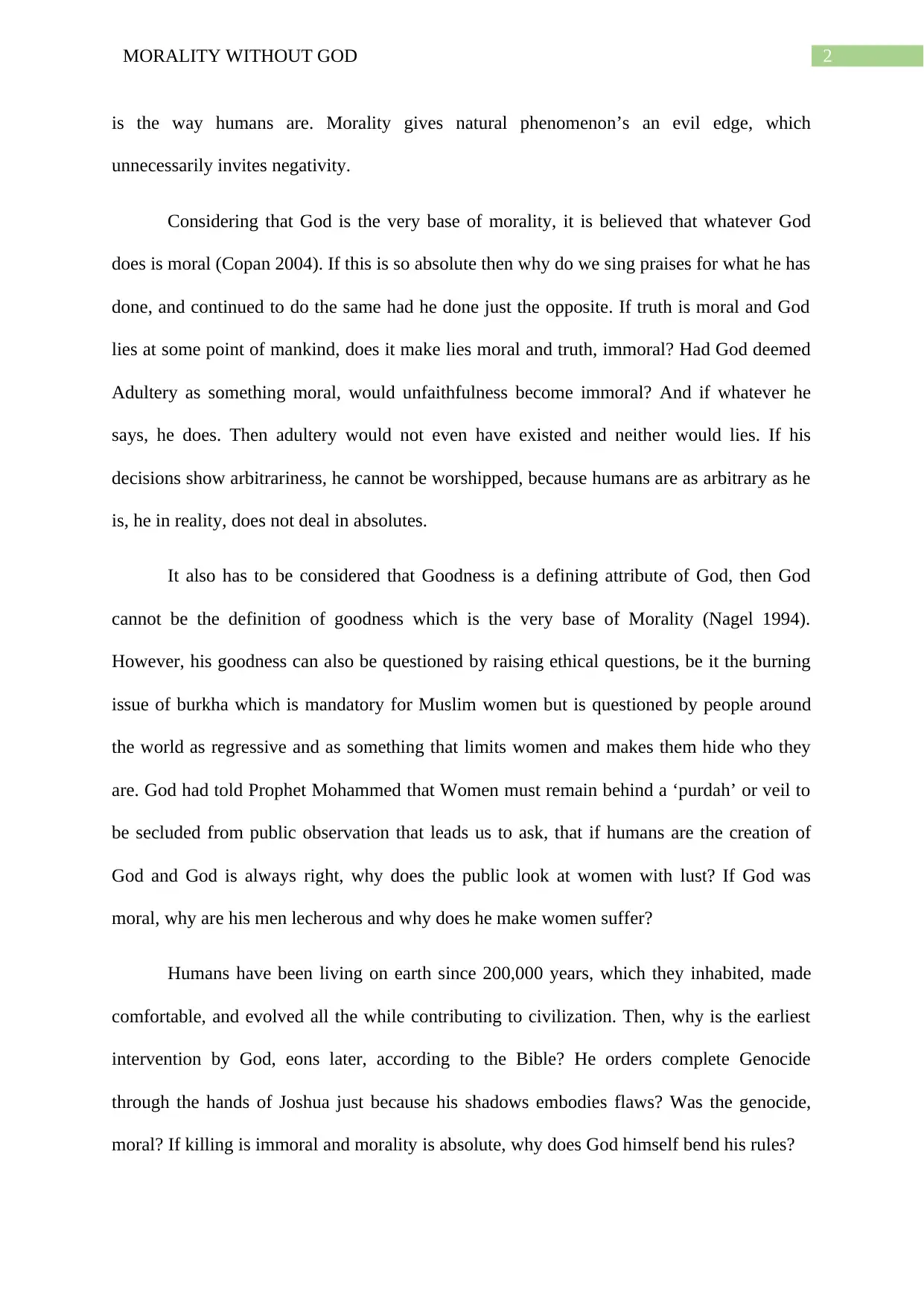
2MORALITY WITHOUT GOD
is the way humans are. Morality gives natural phenomenon’s an evil edge, which
unnecessarily invites negativity.
Considering that God is the very base of morality, it is believed that whatever God
does is moral (Copan 2004). If this is so absolute then why do we sing praises for what he has
done, and continued to do the same had he done just the opposite. If truth is moral and God
lies at some point of mankind, does it make lies moral and truth, immoral? Had God deemed
Adultery as something moral, would unfaithfulness become immoral? And if whatever he
says, he does. Then adultery would not even have existed and neither would lies. If his
decisions show arbitrariness, he cannot be worshipped, because humans are as arbitrary as he
is, he in reality, does not deal in absolutes.
It also has to be considered that Goodness is a defining attribute of God, then God
cannot be the definition of goodness which is the very base of Morality (Nagel 1994).
However, his goodness can also be questioned by raising ethical questions, be it the burning
issue of burkha which is mandatory for Muslim women but is questioned by people around
the world as regressive and as something that limits women and makes them hide who they
are. God had told Prophet Mohammed that Women must remain behind a ‘purdah’ or veil to
be secluded from public observation that leads us to ask, that if humans are the creation of
God and God is always right, why does the public look at women with lust? If God was
moral, why are his men lecherous and why does he make women suffer?
Humans have been living on earth since 200,000 years, which they inhabited, made
comfortable, and evolved all the while contributing to civilization. Then, why is the earliest
intervention by God, eons later, according to the Bible? He orders complete Genocide
through the hands of Joshua just because his shadows embodies flaws? Was the genocide,
moral? If killing is immoral and morality is absolute, why does God himself bend his rules?
is the way humans are. Morality gives natural phenomenon’s an evil edge, which
unnecessarily invites negativity.
Considering that God is the very base of morality, it is believed that whatever God
does is moral (Copan 2004). If this is so absolute then why do we sing praises for what he has
done, and continued to do the same had he done just the opposite. If truth is moral and God
lies at some point of mankind, does it make lies moral and truth, immoral? Had God deemed
Adultery as something moral, would unfaithfulness become immoral? And if whatever he
says, he does. Then adultery would not even have existed and neither would lies. If his
decisions show arbitrariness, he cannot be worshipped, because humans are as arbitrary as he
is, he in reality, does not deal in absolutes.
It also has to be considered that Goodness is a defining attribute of God, then God
cannot be the definition of goodness which is the very base of Morality (Nagel 1994).
However, his goodness can also be questioned by raising ethical questions, be it the burning
issue of burkha which is mandatory for Muslim women but is questioned by people around
the world as regressive and as something that limits women and makes them hide who they
are. God had told Prophet Mohammed that Women must remain behind a ‘purdah’ or veil to
be secluded from public observation that leads us to ask, that if humans are the creation of
God and God is always right, why does the public look at women with lust? If God was
moral, why are his men lecherous and why does he make women suffer?
Humans have been living on earth since 200,000 years, which they inhabited, made
comfortable, and evolved all the while contributing to civilization. Then, why is the earliest
intervention by God, eons later, according to the Bible? He orders complete Genocide
through the hands of Joshua just because his shadows embodies flaws? Was the genocide,
moral? If killing is immoral and morality is absolute, why does God himself bend his rules?
⊘ This is a preview!⊘
Do you want full access?
Subscribe today to unlock all pages.

Trusted by 1+ million students worldwide
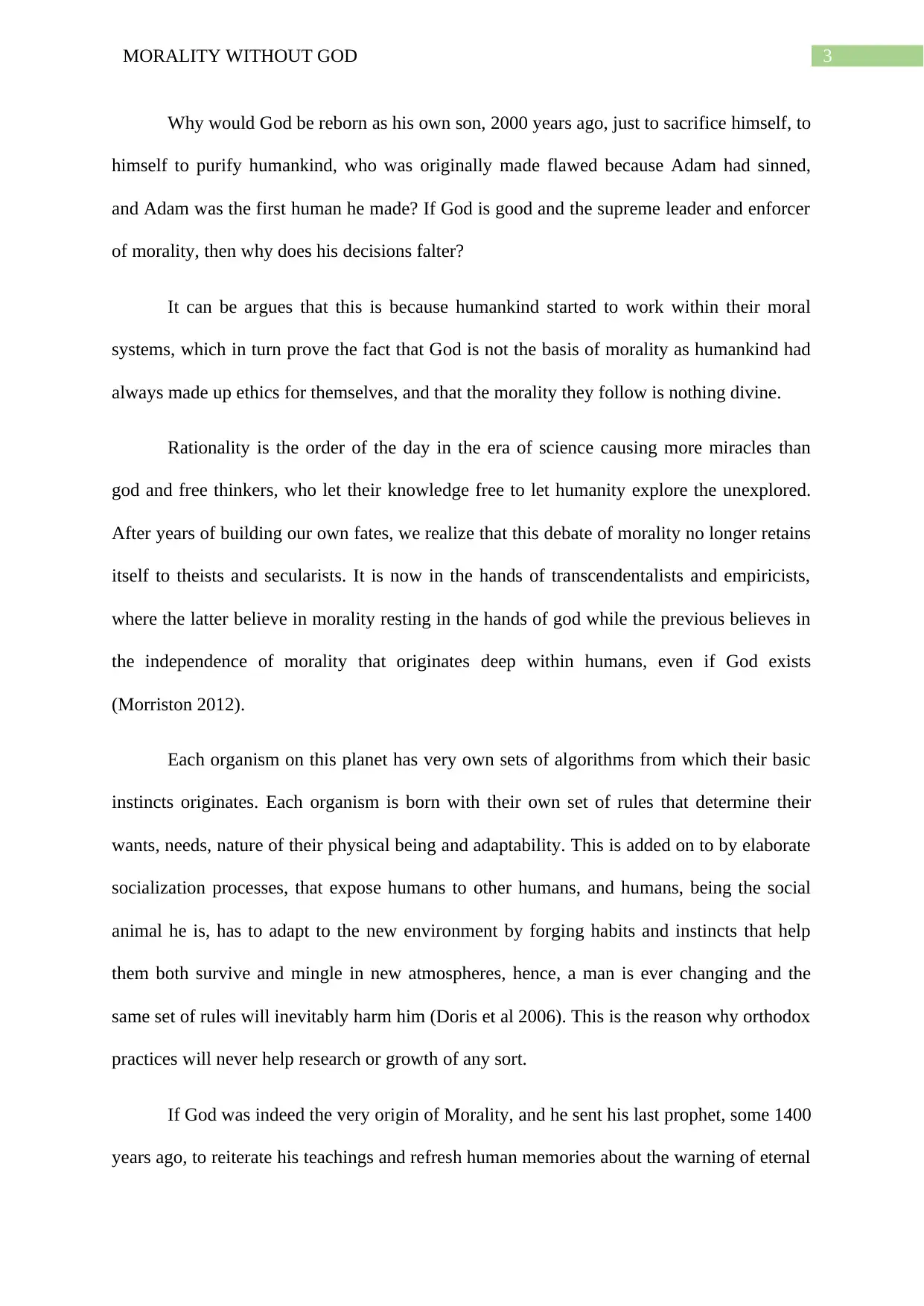
3MORALITY WITHOUT GOD
Why would God be reborn as his own son, 2000 years ago, just to sacrifice himself, to
himself to purify humankind, who was originally made flawed because Adam had sinned,
and Adam was the first human he made? If God is good and the supreme leader and enforcer
of morality, then why does his decisions falter?
It can be argues that this is because humankind started to work within their moral
systems, which in turn prove the fact that God is not the basis of morality as humankind had
always made up ethics for themselves, and that the morality they follow is nothing divine.
Rationality is the order of the day in the era of science causing more miracles than
god and free thinkers, who let their knowledge free to let humanity explore the unexplored.
After years of building our own fates, we realize that this debate of morality no longer retains
itself to theists and secularists. It is now in the hands of transcendentalists and empiricists,
where the latter believe in morality resting in the hands of god while the previous believes in
the independence of morality that originates deep within humans, even if God exists
(Morriston 2012).
Each organism on this planet has very own sets of algorithms from which their basic
instincts originates. Each organism is born with their own set of rules that determine their
wants, needs, nature of their physical being and adaptability. This is added on to by elaborate
socialization processes, that expose humans to other humans, and humans, being the social
animal he is, has to adapt to the new environment by forging habits and instincts that help
them both survive and mingle in new atmospheres, hence, a man is ever changing and the
same set of rules will inevitably harm him (Doris et al 2006). This is the reason why orthodox
practices will never help research or growth of any sort.
If God was indeed the very origin of Morality, and he sent his last prophet, some 1400
years ago, to reiterate his teachings and refresh human memories about the warning of eternal
Why would God be reborn as his own son, 2000 years ago, just to sacrifice himself, to
himself to purify humankind, who was originally made flawed because Adam had sinned,
and Adam was the first human he made? If God is good and the supreme leader and enforcer
of morality, then why does his decisions falter?
It can be argues that this is because humankind started to work within their moral
systems, which in turn prove the fact that God is not the basis of morality as humankind had
always made up ethics for themselves, and that the morality they follow is nothing divine.
Rationality is the order of the day in the era of science causing more miracles than
god and free thinkers, who let their knowledge free to let humanity explore the unexplored.
After years of building our own fates, we realize that this debate of morality no longer retains
itself to theists and secularists. It is now in the hands of transcendentalists and empiricists,
where the latter believe in morality resting in the hands of god while the previous believes in
the independence of morality that originates deep within humans, even if God exists
(Morriston 2012).
Each organism on this planet has very own sets of algorithms from which their basic
instincts originates. Each organism is born with their own set of rules that determine their
wants, needs, nature of their physical being and adaptability. This is added on to by elaborate
socialization processes, that expose humans to other humans, and humans, being the social
animal he is, has to adapt to the new environment by forging habits and instincts that help
them both survive and mingle in new atmospheres, hence, a man is ever changing and the
same set of rules will inevitably harm him (Doris et al 2006). This is the reason why orthodox
practices will never help research or growth of any sort.
If God was indeed the very origin of Morality, and he sent his last prophet, some 1400
years ago, to reiterate his teachings and refresh human memories about the warning of eternal
Paraphrase This Document
Need a fresh take? Get an instant paraphrase of this document with our AI Paraphraser
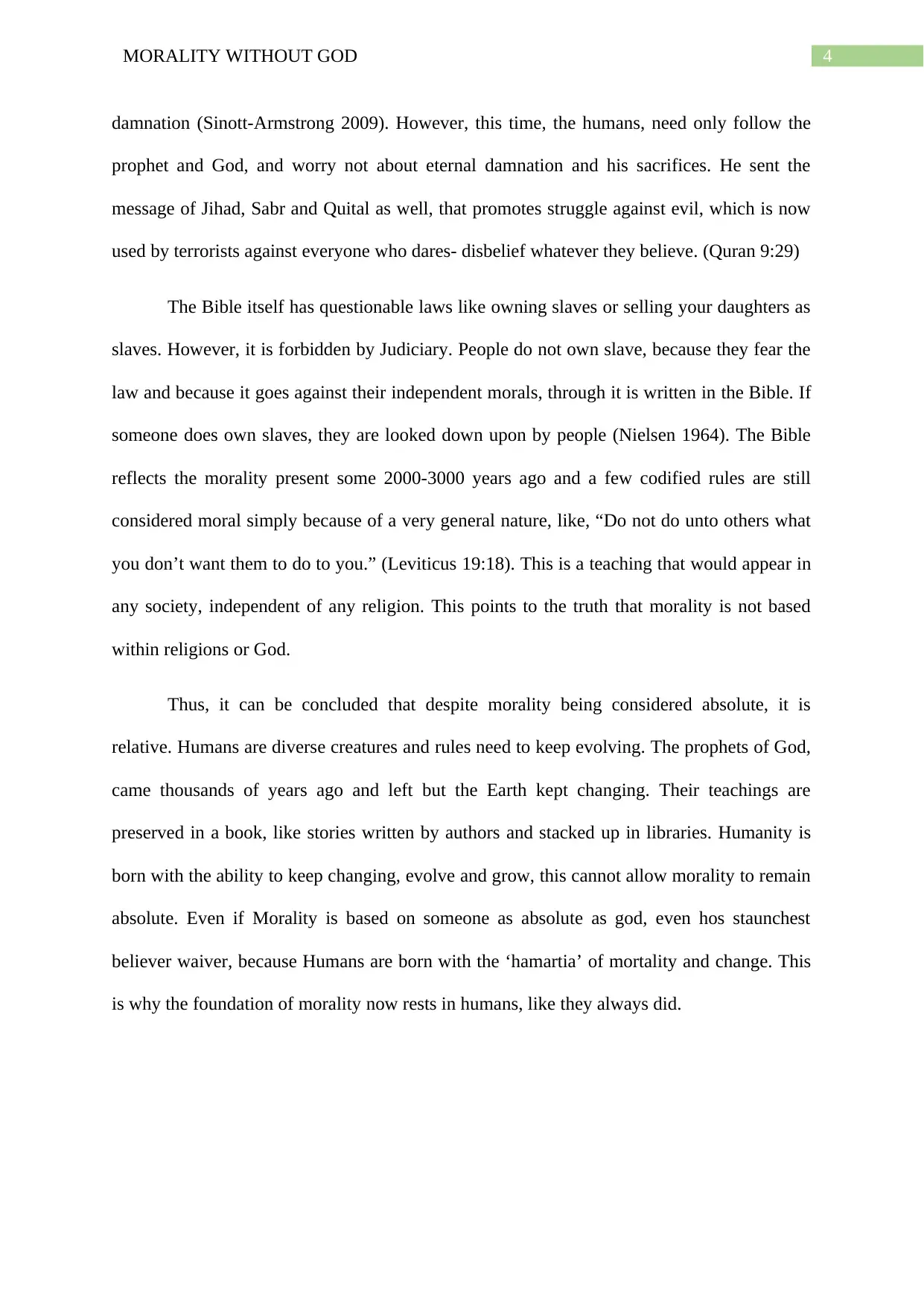
4MORALITY WITHOUT GOD
damnation (Sinott-Armstrong 2009). However, this time, the humans, need only follow the
prophet and God, and worry not about eternal damnation and his sacrifices. He sent the
message of Jihad, Sabr and Quital as well, that promotes struggle against evil, which is now
used by terrorists against everyone who dares- disbelief whatever they believe. (Quran 9:29)
The Bible itself has questionable laws like owning slaves or selling your daughters as
slaves. However, it is forbidden by Judiciary. People do not own slave, because they fear the
law and because it goes against their independent morals, through it is written in the Bible. If
someone does own slaves, they are looked down upon by people (Nielsen 1964). The Bible
reflects the morality present some 2000-3000 years ago and a few codified rules are still
considered moral simply because of a very general nature, like, “Do not do unto others what
you don’t want them to do to you.” (Leviticus 19:18). This is a teaching that would appear in
any society, independent of any religion. This points to the truth that morality is not based
within religions or God.
Thus, it can be concluded that despite morality being considered absolute, it is
relative. Humans are diverse creatures and rules need to keep evolving. The prophets of God,
came thousands of years ago and left but the Earth kept changing. Their teachings are
preserved in a book, like stories written by authors and stacked up in libraries. Humanity is
born with the ability to keep changing, evolve and grow, this cannot allow morality to remain
absolute. Even if Morality is based on someone as absolute as god, even hos staunchest
believer waiver, because Humans are born with the ‘hamartia’ of mortality and change. This
is why the foundation of morality now rests in humans, like they always did.
damnation (Sinott-Armstrong 2009). However, this time, the humans, need only follow the
prophet and God, and worry not about eternal damnation and his sacrifices. He sent the
message of Jihad, Sabr and Quital as well, that promotes struggle against evil, which is now
used by terrorists against everyone who dares- disbelief whatever they believe. (Quran 9:29)
The Bible itself has questionable laws like owning slaves or selling your daughters as
slaves. However, it is forbidden by Judiciary. People do not own slave, because they fear the
law and because it goes against their independent morals, through it is written in the Bible. If
someone does own slaves, they are looked down upon by people (Nielsen 1964). The Bible
reflects the morality present some 2000-3000 years ago and a few codified rules are still
considered moral simply because of a very general nature, like, “Do not do unto others what
you don’t want them to do to you.” (Leviticus 19:18). This is a teaching that would appear in
any society, independent of any religion. This points to the truth that morality is not based
within religions or God.
Thus, it can be concluded that despite morality being considered absolute, it is
relative. Humans are diverse creatures and rules need to keep evolving. The prophets of God,
came thousands of years ago and left but the Earth kept changing. Their teachings are
preserved in a book, like stories written by authors and stacked up in libraries. Humanity is
born with the ability to keep changing, evolve and grow, this cannot allow morality to remain
absolute. Even if Morality is based on someone as absolute as god, even hos staunchest
believer waiver, because Humans are born with the ‘hamartia’ of mortality and change. This
is why the foundation of morality now rests in humans, like they always did.
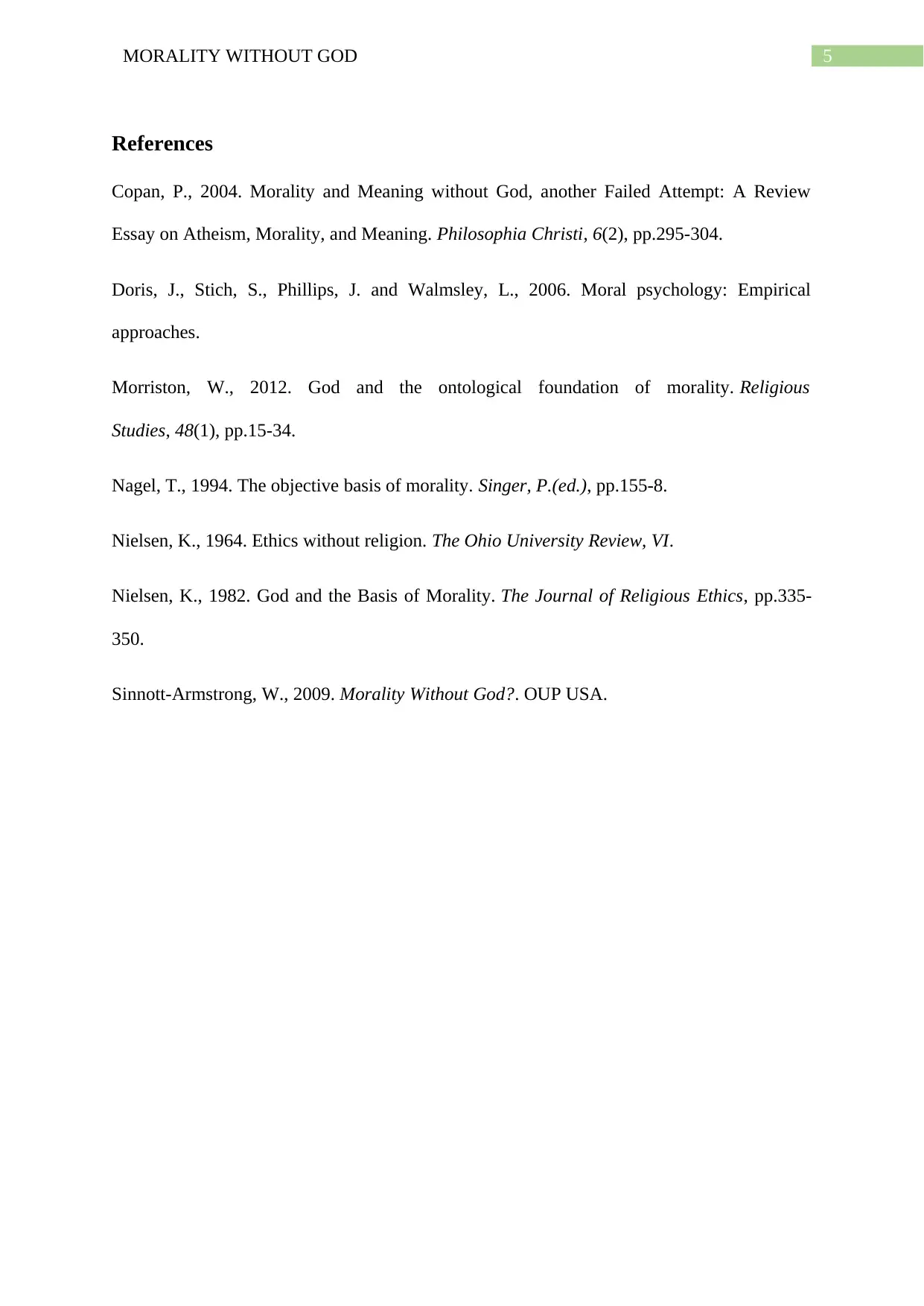
5MORALITY WITHOUT GOD
References
Copan, P., 2004. Morality and Meaning without God, another Failed Attempt: A Review
Essay on Atheism, Morality, and Meaning. Philosophia Christi, 6(2), pp.295-304.
Doris, J., Stich, S., Phillips, J. and Walmsley, L., 2006. Moral psychology: Empirical
approaches.
Morriston, W., 2012. God and the ontological foundation of morality. Religious
Studies, 48(1), pp.15-34.
Nagel, T., 1994. The objective basis of morality. Singer, P.(ed.), pp.155-8.
Nielsen, K., 1964. Ethics without religion. The Ohio University Review, VI.
Nielsen, K., 1982. God and the Basis of Morality. The Journal of Religious Ethics, pp.335-
350.
Sinnott-Armstrong, W., 2009. Morality Without God?. OUP USA.
References
Copan, P., 2004. Morality and Meaning without God, another Failed Attempt: A Review
Essay on Atheism, Morality, and Meaning. Philosophia Christi, 6(2), pp.295-304.
Doris, J., Stich, S., Phillips, J. and Walmsley, L., 2006. Moral psychology: Empirical
approaches.
Morriston, W., 2012. God and the ontological foundation of morality. Religious
Studies, 48(1), pp.15-34.
Nagel, T., 1994. The objective basis of morality. Singer, P.(ed.), pp.155-8.
Nielsen, K., 1964. Ethics without religion. The Ohio University Review, VI.
Nielsen, K., 1982. God and the Basis of Morality. The Journal of Religious Ethics, pp.335-
350.
Sinnott-Armstrong, W., 2009. Morality Without God?. OUP USA.
⊘ This is a preview!⊘
Do you want full access?
Subscribe today to unlock all pages.

Trusted by 1+ million students worldwide
1 out of 6
Related Documents
Your All-in-One AI-Powered Toolkit for Academic Success.
+13062052269
info@desklib.com
Available 24*7 on WhatsApp / Email
![[object Object]](/_next/static/media/star-bottom.7253800d.svg)
Unlock your academic potential
Copyright © 2020–2026 A2Z Services. All Rights Reserved. Developed and managed by ZUCOL.





